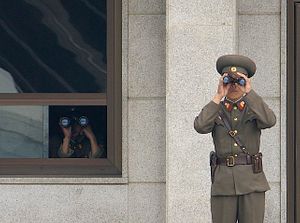North Korea is about as isolated diplomatically as it ever has been. After declining an invitation to China’s celebrations of the 70th anniversary of the end of World War II, North Korean leader Kim Jong-un reasserted his refusal to make his first out-of-country visit as head of state because Xi Jinping refused to sit next to Kim on the reviewing stand.
According to the September 1 edition of KGS’s NightWatch, “North Korea insisted their Supreme Leader receive the highest honors as a guest” and be placed on Xi’s right hand side. When informed by the Chinese that he would be placed at the end of the reviewing stand, Kim canceled. In an attempt to snub China back, North Korea sent Choe Ryong-hae, secretary for the Korean Workers’ Party and chairman of the State of Physical Culture and Sports Commission, in Kim’s place.
While North Korea’s delegate was relegated to the sideline, South Korea’s President Park Geun-hye was placed only one seat over from President Xi Jinping, closer than any other leader except Vladimir Putin. The symbolism was loud and clear.
Since their first official meeting as heads of State in 2013, Xi has met with Park six times. Before Kim Jong-il’s death, he visited China four times between 2010 and 2011. Kim’s son, in stark contrast, has yet to visit his country’s most important neighbor or meet China’s head of state. In one generation Kim Jong-un has decimated the 60 years of friendship between China and North Korea, a relationship once described “as close as lips and teeth.”
What Kim seems to have forgotten is the statement is far from the fervent declaration of friendship it is often characterized as. Originating from the Chinese aphorism, “When the lips are gone, the teeth will be cold” (唇亡齿寒), the phrase was a continual reminder to past North Korean leaders that their country exists solely because of its utility to China as buffer state, and not out of a fraternalistic love for a fellow communist nation.
Earlier this year North Korea’s “Peerless Leader” declined a similar invitation to Russia’s May 7th Victory Day Parade. After turning a cold shoulder to his two closest historical allies, speculation that Kim does not wish to share the stage with other world leaders for his inaugural trip abroad seem confirmed. Furthermore, it would appear the Hermit Kingdom’s Supreme Leader takes his own domestic propaganda about North Korea’s greatness seriously. Given he is the scion of a personality cult, his solipsism is a testament to the unprecedented efficiency of North Korea’s Propaganda and Agitation Department in creating a 24 million person echo chamber. Such an attitude would also explain, among other things, why Kim met with former NBA star Dennis Rodman yet disregarded Chinese diplomats sent to Pyongyang a month later.
The Diplomat’s Adam Cathcart noted in his recent article, “Assessing North Korea’s ‘Ground Game’ with China,” that “the men and women of the DPRK Foreign Ministry are certainly able to construct a gradual strategy leading toward rational goals, including an improved relationship with China.” But Aidan Foster-Carter, a long-time Korea watcher, has noted there are “fears that Kim Jong-un was acting impulsively without an endgame in mind.” As the “August Crisis” between the Koreas showed, that impulsivity can quickly turn boisterous but hollow rhetoric into nearly an all-out war.
It’s no wonder North Korea is as isolated as it has ever been; when delusions of international grandeur usurp geostrategic and rationalist axioms, the Hermit Kingdom’s policies reflect the fantasies harbored by its eccentric leader.
Alexandre Dor is an editorial assistant at The Diplomat.

































